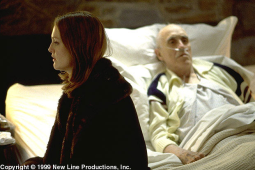Magnolia Film Analysis
Jan 31/00 (Abridged version)
|
|
by Richard Stanwick |
Although Magnolia can be viewed through many prisms, including a religious realm where conflicted sinners are trapped by their history of transgressions in past relationships ("we are done with the past but the past is not done with us"), I will consider as well some of its existentialist, psychological and postmodern foundations. One of the film's evaluations results in the disconcerting realization that religious belief in typical postmodern fashion, is evaluated by the standards of pop culture as just another item to be considered, partially consumed and discarded, and replaced instead by an inversion of Kierkegaard's leap of faith from god into the laps of wayward and unreliable humans. The narrator stresses that Jung's acausal synchronicity applies to apparent accidents and proceeds to demonstrate that they are related, beneficial and meaningful. Moreover, a droning postmodern undercurrent of the missing Father and his structures/rules sweeps away any possible Oedipal resolution by simply overcoming father/god and (re)acquiring Eden. Instead the characters swim in a wayward stream of displacements leading to an unavoidable interaction with others.
In the desolate modern American landscape of the human condition, tormented and incomplete people in bondage to their historical past deal with regret, are forced to confront their selves, regress, and are redeemed after various ludicrous miracles from the sky (torrential rain, the curse/blessing of Exodus frogs, falling humans, guns), by accepting themselves, their need to be saved by others and the necessity to "wise up".
Various existential themes are co-mingled with religious salvation themes and although miraculous events present some humour to lighten an unpleasant task, there is no Moses to lead anyone to some promised land, only the opportunity of an uncertain fate chained to others in a condition of choice. (Sartre's 'Hell is other people' sub-theme decrees that these chains are unbreakable). Standard existentialist and postmodern themes abound: incompleteness, absurdity, loss of values, nihilism, loss of direction, self deception, uncertainty, fear of freedom, nausea, resentment of the human condition, and a plethora of coincidences to emphasize the lack of coherent answers based on the traditional modern Heideggerian foundations of rationality, time and subjectivity.
By a clever use of simultaneity, the characters are tied concurrently to a game snow (where answers to the past are required) staged as a microcosm of conflicted life in bondage to the past (others) where players seek escape based on the absurd but common belief that by correctly reciting the past in a prayer-like structured mode, one will be magically rewarded and redeemed. Partial reinforcement theory rules - we continue to repeat what has worked in the past. The price for playing by these rules, (Heiddegger's extended leitmotif of the need to evolve anxiety creating structures) however, is high and the result uncertain since it is based on magical thinking and our need to run from the present.
Various psychological defences of the characters, in particular repression, denial and projection, are intertwined with a persistent underlying drive to eradicate some original sin in order to alter the present condition. To attempt to confront, overcome and resurrect oneself amounts to creating oneself anew. That escape from the past is contingent, that the past remains but that one can change the future by altering the present, even if one returns to the same originating position with a new understanding, is the predominant message of salvation.

Magnolia (New Line, 1999)
Frank, played by Cruise at his best in his usual angry young man mode, is aptly named as the teacher of ostensible truth, power and control who with arms nailed to an unseen cross is projected as an illuminated (Lucifer) savior. His crucified humanity, now a loaded shell, a persona with rigid firm ego boundaries of patent masculinity, launches a provocative assault, laced with inexplicable resentment, against Woman. His assumed control and power over his own vulnerability (fear of his undeveloped feminine component generalized as woman) results paradoxically from the rejection by and loss of his father followed by the incessant care of his slowly dying mother whom he was unable to save. All attempts to find a stable centre fail since he is only partially complete, a shell in need of a guiding spirit. His all-encompassing impotent rage is projected along with his need to control the symbolic Woman who constitutes the loss of his childhood and manhood. Like a fatherless boy of the ghetto, he shuns the excessive identification and nauseating closeness associated with his mother and her powerless circumstance. To acquire her world would only confirm his loss and her power to destroy. To him she only means burden and loss of freedom; thus he abuses Woman in order to maintain control and detachment. Moreover, his loss of masculinity resulting from the inability to control the inevitable suffering and eventual death of his mother lead him to create and identify with what he lacks, a powerful male image. His artificial self-acquired mastery over himself results tragically from lack of opposition since he cannot win the badge of manhood by defeating a foe who is missing or a cause that is inexplicable. The grateful male crowd (representing the incomplete male) is willing to pay Frank to attain his techniques to compensate for its loss and to overcome its incompleteness through the power of maintaining distance and control. But Frank paradoxically eventually finds redemption in what he denied, in the traditional female manner of acquiring power, through interaction with the Other.
Despite his provocative and intimidating behaviour, his artificial history, formed to aid his false self and maintain his denial and repression, is probed and dissected by a two-faced reporter who poses as a searcher of truth but whose real goal is humiliation. To the satisfaction of the audience, she is not redeemed. Since a la Nietzsche, by causing shame she demonstrates that she is bad. Her fate is to be "judged quietly" by others because redemption without recognition and acceptance of sin is impossible.
The facing of mortality and regret by the game show host Jimmy (P.R. Hall) dying of bone cancer is augmented by his loss of faculties while attempting to control the game (conflicted life) which, like his illness, becomes increasingly unpredictable and unstable. His unacknowledged sin of excessive closeness to his daughter Claudia (H. Waiter) which denied her the freedom to grow, is averted by resort to deficient memory and self-deception, but his eventual resolution by suicide is prevented by a frog from heaven because he attempts, however furtively, to reconcile with his daughter. Self-deception, apparently is no bar to salvation if one is contrite.
His wife is willing to forgive all but his lack of acceptance of his responsibility for molesting his daughter whose rage cannot be placated because he will not acknowledge his sin. (She, like Frank cannot overcome a ghost). Both Wife's and daughter's salvation is tied to avoidance of self-deceivers.

Magnolia (New Line, 1999)
The guilt of the game show owner and producer, Earl Partridge (J. Roberts) is mirrored by his scheming, cheating wife Linda (a. Moore) who is addicted to drugs and attempts suicide to escape the guilt of her betrayal of herself, her vows and her husband. The ambiguity of her sudden unexplained guilt is left unresolved but she too is accidentally saved because she repents and chooses adherence to the required stance.
Earl Partridge (bird, frog, rain, sky themes abound) dying in bed portents salvation of all by links to the death scene in 2001 with accompanying Zarathustra music where man is transformed into child. His guilt resulting from leaving his dying wire with their 14 year old son (Frank) leads his empathetic mediating caretaker Phil, (P.S. Hoffman) who finds redemption through identifying with and easing the suffering of others, to track down his lost son. The convoluted way of locating Frank, the apparently random but related conversations with strangers and Frank's walks down interminable hallways surrounded by people all accentuate the emotional distances among the characters and the difficulty of connecting to anyone.
Frank, the rejected son finally confronts his dying father who is now unable to reply, apologize and expiate his guilt. Without the articulation and acceptance of his father's sin, Frank cannot forgive or overcome the unknown one, he can only endure his memory. The cathartic release of his tormented repressed anger and simultaneous conflicted fear of another loss of and desire for his missing father is gripping. He faces uncertainty but his acceptance of his past and his anguished self, the veil of his repression and denial of his history is lifted and results in the loosening of his current defences and his false self. The painful return from/to his original position confirms that rebirth is painful. He can now join the family of man.
Stuck-in-the-past former child star Donnie (Macey) who was once struck by lightning and whose self-earned legacy was stolen by his parents lacks a centre of acceptance. He has love (which he never had) to give but he hasn't yet learned that love is a shared adventure. Not even an embarrassed bartender will accept his pathetic presentation of his need for love. His subsequent theft from his surrogate parents (employer) represents the stealing of love to compensate for and remedy a projected defect, his mouth and teeth which were once the source of his former success and power.
During the miracle from the godless sky, which is staged as a parody (as excess manna from heaven), he is struck by a frog, loses his grip and fails in his mission to rectify his wrong. When he sees that his face is now truly disfigured, he recognizes the futility of changing outside appearances. Salvation lies within. With the intervention of a merciful cop (W.H. Reilly) he returns the stolen money and accepts that he is injured but not deficient to the extent that he has to steal love. Because he is pure or heart, he is absolved and is now free to choose his future in the present.
The initially compliant game show kid (J. Blackman) alters his condition of bondage by sacrificing the moment of glory by a paradoxical (anorexial) attempt to avoid the game by controlling his body until he loses bladder control. When he realizes that adherence to arbitrary debilitating rules crushes creativity and freedom, he loses his ambition to succeed conventionally by a symbolic Freudian urethral discharge. Both the game and his body are beyond his control. He confronts his parasitic father as an incomplete child (no mother), asking to be treated anew with respect without having to constantly sacrifice himself to earn the love of his father.
Claudia, the female addict who is unable to forget or deal with her molested past by Jimmy fears rejection from the cop who is presented as a centre of stability. Her previous attempts to fix herself by reenacting the past by testing lovers of her father's age failed because the substitute was false. Only truth works. The road to redemption begins with a pleading prayer song titled "Save Me" (implied is "from myself"). She is redeemed when she takes a risk, opens up, (restaurant scene with cop) and later accepts hope in him rather than fearing an unchanging present governed by an unrelenting past. Her optimistic future-accepting smile is redemption itself and completes the message at the end of the movie.
The cop who shows an interest in her, needs no change, only completion by another, but he too demonstrates his universal deficiency by losing the badge of his profession, his gun. This loss of power is later recovered from the sky god and magically saves a life. His stability rests on his identification with the law which he chooses to interpret selectively as a wise judge with the power to render mercy.
All the conflicted characters seeking the missing part of their selves encounter fate through various chance encounters and falls from the present condition. Although there is no sight of god or a Moses, the underlying theme of existential loss of god necessitates personal responsibility, for redemption here is simply acceptance of one's history and the acceptance of the consequences of one's choice. The evocative concurrent placing of the reference in Exodus to the frog plague (here also a sign of redemption) merely accentuates that the religious message has the same significance in popular culture as Taco Bell and other commercial passing fads. Indeed, god is dead.
Nevertheless, the major characters suddenly together but apart unite to recite a prayer-like song in recognition of the power of acceptance of self and the power to change the present by overcoming the past through nope and action. In great existential fashion, they accept the responsibility to be free "wise up") and try again.
Although they are all intertwined by Jung's acausal synthronicity and absurd beneficial interventions from an unknown sky god, the characters are united concurrently in time by fantastic music by Aimee Mann that reinforces the message that everyone resides in the same existential boat, that human fully and suffering is common and that we suffer under the same circumstances and for similar complex reasons. Because we are able to choose, we are largely responsible for the creation our complete selves.
Notable is the rejection of the expected and overt "sacrifice of the son" theme which forms a major undercurrent of mythology. Throughout Magnolia, the Father in his various manifestations cannot be destroyed, not because of his excessive power, but because in great postmodern fashion, he is absent. Oedipus has no rival to overcome and Christ has no need to sacrifice himself. Out of necessity, the displaced sacrifice of the cast-from-Eden group revolves around the perception of the loss of the characters' selves (loss of validity and meaning) and their attempt to reach salvation through completion and identification not with an absent father or god but with another human being. The paradox remains that once the wounds of the past have been reopened and healed through reunion and reconciliation, we find ourselves at the beginning of an eternally recurring nightmare without final hope or absolution. We are in the midst of others, who constitute both hell and salvation. Verily, an existentialist message.
Traditional believers may no doubt be distressed by the godless and apparently futile message that salvation is to be found in the unpredictable and unreliable other but many will view it as an ennobling Nietzschean adventure of acceptance of "yes" to life as it is. But here the overcoming of the self results in an eternal enduring the Other. Instead of emphasizing freedom with the opportunity to say along with Nietzsche "this is my way, what is yours?" Magnolia leaves one with a residual feeling that the return or rebirth results in an ambivalent Hegelian union with the Other. Instead of being tied to father/god we are chained to copies or ourselves. In a similar echo, the opportunity to flee from the other is rejected in Sartre's play "No Exit" simply because to us human-all-to-human herd animals the resultant isolation is experienced as psychologically devastating and unavailable except perhaps to some variants of the preposterous ones. Salvation indeed.

